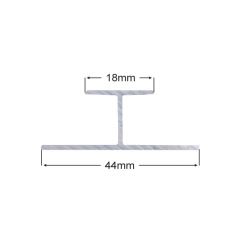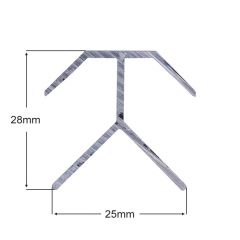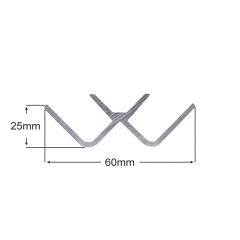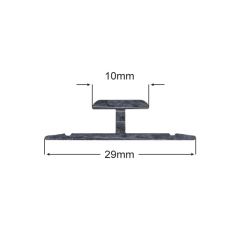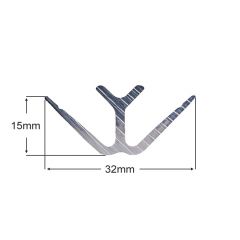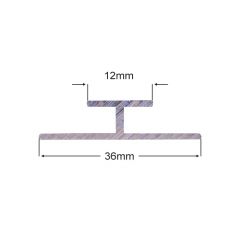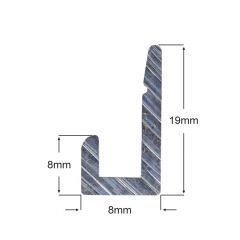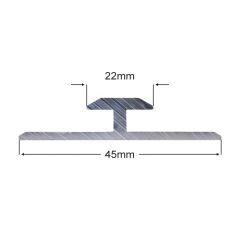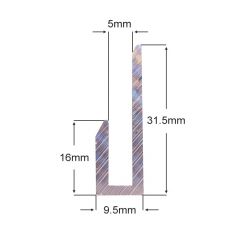- Material
-
- Aluminium 61
- Brass 8
- Stainless Steel 8
- Galvanised Steel 1
- Mild Steel 1
Aluminium
CAN'T FIND WHAT YOU'RE
LOOKING FOR?
Check out our parent company, Doré Metals, to explore more available options call 01794 521070 or email s[email protected]

Aluminium: Lightweight, Durable, and Exceptionally Versatile
At Click Metal, we offer a wide selection of aluminium products that are perfect for a vast range of applications. Known for its unique combination of properties, aluminium is a lightweight yet strong, durable, and corrosion-resistant material. Whether you’re working on industrial projects, architectural designs, or creative DIY tasks, aluminium offers unmatched versatility and cost-effectiveness.
Why Choose Aluminium from Click Metal?
Aluminium provides excellent structural integrity without adding unnecessary weight, making it ideal when weight reduction matters. Its natural resistance to rust and weathering means it performs brilliantly both indoors and outdoors, requiring minimal maintenance over time.
As a strong conductor of heat and electricity, aluminium works perfectly in HVAC systems, electronics, and thermal applications. It's also remarkably easy to cut, drill, weld, and machine, which is why professionals and hobbyists alike choose it for projects of all scales.
With over 70 years' experience in the metals industry, we supply aluminium products cut precisely to your requirements, backed by our free cutting service and 3–5-day lead times.
Our Aluminium Products
We stock a wide variety of aluminium products, all of which can be cut to your exact specifications:
-
Aluminium Sheets - Available in multiple grades and thicknesses, these sheets are suitable for cladding, roofing, panelling, and decorative finishes.
-
Aluminium Bars - Perfect for structural frameworks, supports, and machining into components.
-
Aluminium Tubes - Lightweight and rigid, these tubes are widely used in construction, piping, and automotive applications.
-
Aluminium Treadplates - Featuring a textured surface for added grip, these are ideal for flooring, walkways, and decorative applications.
-
Tooling Plates - Precision flat plates designed for engineering and fabrication work.
Applications of Aluminium
Aluminium’s versatility makes it suitable for countless projects, including:
- Construction and Architecture: Curtain walls, window frames, roofing, and facades.
- Automotive and Aerospace: Lightweight components that enhance fuel efficiency.
- Electronics: Heat sinks, casings, and conductive components.
- Food and Beverage Industry: Hygienic and non-corrosive surfaces for packaging and equipment.
- DIY and Creative Projects: Custom furniture, art installations, and garden structures.
Cut-to-Size Precision
We understand that every project is unique, which is why we offer a bespoke cutting service for all aluminium products. Simply specify the dimensions—length, width, and thickness—and we’ll deliver your aluminium pieces with a precision tolerance of –0mm, +2mm, ensuring a perfect fit every time.
Aluminium FAQs
If you’re looking to work with aluminium for your next project and have some concerns about whether aluminium is the right material to use, we answer the internet’s most frequently asked questions below.

Our Useful Aluminium Guides:
What Is Aluminium Used For?
Why Aircraft Aluminium Alloys Are Used in Aerospace Design
How the Aluminium Recycling Process Helps the Planet
Aluminium Façade Panels: 10 Smart Architectural Uses
Aluminium vs Steel: What’s the Difference?
How to Braze Aluminium and When It’s Better Than Welding
How to Repair Aluminium Holes Without Welding (Easy Guide)
What Are the Best Techniques for Joining Aluminium?
The Step-by-Step Guide to Removing Scratches on Aluminium
Round vs Square Metal Bars: Which Is Stronger?
Joining Aluminium Without Welding
Aluminium Sheets: Everything you Need to Know
Choosing the Right Aluminium Grade
Common Uses for Aluminium
